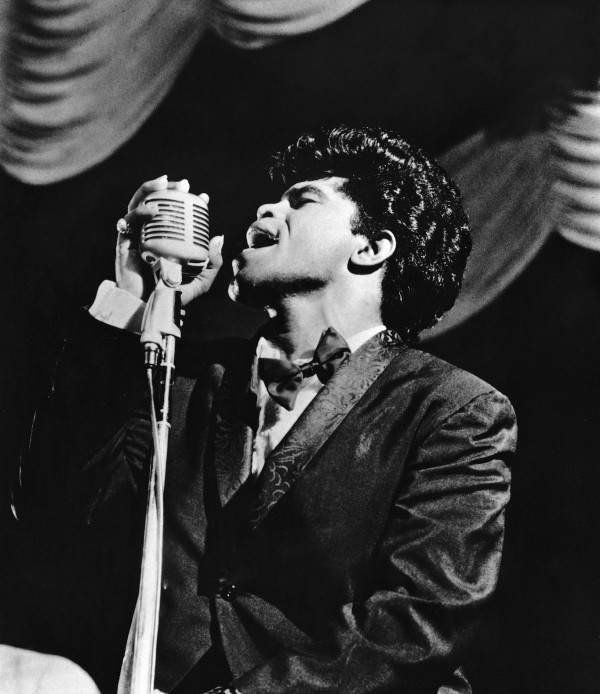THE NEW YORKER: The Stones had come to the States from England determined to play black R. & B. for a mainly white audience that did not know its Son House from its Howlin’ Wolf. They were already stars, and the T.A.M.I. producers had them scheduled to close the show. James Brown did not approve. “Nobody follows James Brown!” he kept telling the show’s director, Steve Binder. Mick Jagger himself was hesitant. He and Keith Richards were boys from Kent with an unusual obsession with American blues. They knew what Brown could do. In Santa Monica, they watched him from the wings, just twenty feet away, and, as they did, they grew sick with anxiety.
Brown, who had played the Chitlin Circuit for years, was genuinely incensed that the producers would put him on before pallid amateurs (in his mind) like the Stones. His performance, he later admitted, was a cutting contest that he refused to lose. As Brown puts it in his memoir, “James Brown: The Godfather of Soul,” “We did a bunch of songs, nonstop, like always. . . . I don’t think I ever danced so hard in my life, and I don’t think they’d ever seen a man move that fast.” It was a four-song set: the staccato blues number “Out of Sight”; an astonishing inside-out revival of “Prisoner of Love,” which had been recorded by smoothies like Billy Eckstine and Perry Como; the dramatic centerpiece “Please, Please, Please”; and the closer, “Night Train,” which the boxer Sonny Liston would play to get himself going in the gym.
What is there to say? If Astaire’s dancing was the graceful line of black-tie seduction, Brown’s was a paroxysm of sexual frenzy, a blend of Pentecostal possession and erotic release. RJ Smith’s “The One” is the book to read on James Brown. (The Profile to read is Philip Gourevitch’s brilliant “Mr. Brown,” published in 2002, four years before Brown’s death. Two veteran critics, Alan Light and Edna Gundersen, have written interesting pieces on the T.A.M.I. performance.) Smith quotes Brown as saying that the T.A.M.I. performance was the “highest energy” moment of his career: “I danced so hard my manager cried. But I really had to. What I was up against was pop artists—I was R. & B. I had to show ’em the difference, and believe me, it was hard.” MORE
THE NEW YORKER: He was twenty-two years old, a lithe, rippling sinew of a man, on parole after three years in the state-penitentiary system. He had been locked up at the age of fifteen for stealing from parked cars in Augusta, where he was raised in a whorehouse run by his Aunt Honey. He was a middle-school dropout, with no formal musical training (he could not read a chart, much less write one), yet from early childhood he had realized in himself an intuitive capacity not only to remember and reproduce any tune or riff he heard but also to hear the underlying structures of music, and to make them his own. He had started singing in church, not long after he began walking, and the hand-clapping, stomp-and-shout, get-all-the-way-down-on-your-knees spirit of the Baptist gospel pulpit formed the bedrock of his musical impulse. But his attunement to the sacred never inhibited his appetite for the profane. He claims to have mastered the harmonica at the age of five, blowing “Lost John,” “Oh, Susannah,” and “John Henry,” and one afternoon, when he was seven, he taught himself to play the organ by working out the fingering of “Coonshine Baby.”
Before long, he was picking up guitar licks to such songs as “(Honey) It’s Tight Like That” from the great bluesman Tampa Red, who was dating one of Aunt Honey’s girls. By the time he was twelve, the young prodigy was fronting his own group, the Cremona Trio, and winning talent shows with a romping rendition of Louis Jordan’s “Caldonia (What Makes Your Big Head So Hard?).” In reform school in the tiny north Georgia town of Toccoa, his nickname was Music Box, and he returned to singing for the Lord, forming a gospel quartet that made its own instruments: a paper-and-comb harmonica, a drum set of old lard tins, a broomstick-and-washtub bass. The warden was impressed, as was a young gospel singer in Toccoa named Bobby Byrd, who’d heard him sing at the prison gate, and offered to give him a home and find him a job if he could win his release. “I want to get out and sing for the Lord,” James Brown wrote to the parole board, and although these words suggest an act of a rather different order than the one he and Byrd eventually put together with the Flames, nobody could deny, as he slithered among the ladies on night-club floors, that he sang as if he’d burn in Hell if he stopped. MORE

